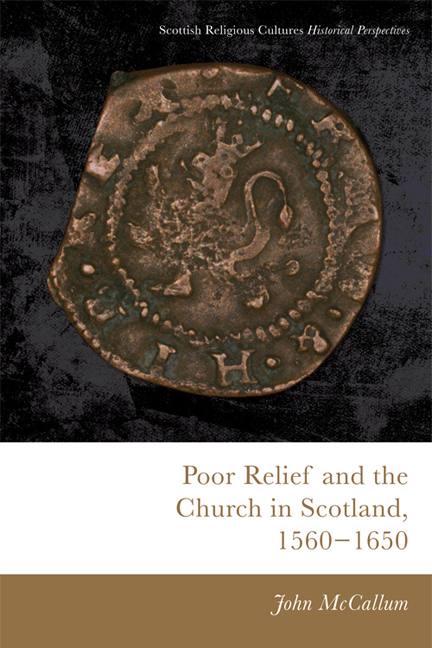Book contents
- Frontmatter
- Contents
- List of Tables
- Acknowledgements
- Conventions
- Abbreviations
- Map of Key Locations Mentioned
- Introduction
- 1 Ideas, Attitudes and Ambitions
- Part I The Development of Kirk Session Poor Relief
- Part II The Nature of Kirk Session Poor Relief
- 5 The Mechanics of Relief
- 6 Who Were the Poor? The Recipients of Relief
- 7 Who Was Deserving? Decision-making and Discrimination
- 8 Beyond the Kirk Session: Mixed Economies of Relief
- Conclusion
- Appendix Equivalent Values from Wages and Prices
- Bibliography
- Index
5 - The Mechanics of Relief
from Part II - The Nature of Kirk Session Poor Relief
Published online by Cambridge University Press: 14 September 2018
- Frontmatter
- Contents
- List of Tables
- Acknowledgements
- Conventions
- Abbreviations
- Map of Key Locations Mentioned
- Introduction
- 1 Ideas, Attitudes and Ambitions
- Part I The Development of Kirk Session Poor Relief
- Part II The Nature of Kirk Session Poor Relief
- 5 The Mechanics of Relief
- 6 Who Were the Poor? The Recipients of Relief
- 7 Who Was Deserving? Decision-making and Discrimination
- 8 Beyond the Kirk Session: Mixed Economies of Relief
- Conclusion
- Appendix Equivalent Values from Wages and Prices
- Bibliography
- Index
Summary
Introduction
In the previous section, Chapters 2–4 assessed the development and resilience of kirk session poor relief. This chapter steps back to consider the essential character and organisation of the welfare system operated by kirk sessions as a whole. There has been a growing recognition amongst historians that ecclesiastical relief schemes in pre-modern Europe were not necessarily casual or haphazard, or inherently less efficient than secular provision. There has however been little consideration in Scottish studies of the possibility that the church's own relief schemes might have been effectively and carefully administered: instead the fact that the schemes were not proper Poor Laws tends to dominate. One recent study of provision during the civil wars has noted the effectiveness of kirk session fundraising, and there are some signs that historians are increasingly taking the organisational and administrative efforts of kirk sessions, not just church discipline, more seriously, especially for the eighteenth century. But very little attention has been paid to the actual workings of the reformed church's poor relief as a system. In order to understand the mechanisms and processes through which relief worked, this chapter adopts a tripartite structure, following the flow of resources from contributor, through the kirk session, to poor recipient. Starting with fundraising, it assesses the significance of the various sources of income which kirk sessions could draw. Secondly, it looks at those individuals in charge of overseeing and administering parish welfare, and their varying roles in the process. Thirdly, it examines the forms in which relief was provided to the poor, and the approaches that kirk sessions took to the challenging task of assisting the needy.
For each of these, evidence is gathered from across lowland Scotland, and considered thematically rather than chronologically or geographically. One important implication of previous chapters must therefore be noted. It should not be assumed that the processes and structures analysed here were entirely applicable across Scotland from 1560 to 1650. As we saw earlier, systems of relief were often gradually developed, and there is very limited evidence on rural relief prior to the seventeenth century. What follows cannot be assumed to have applied equally in, say, rural Perthshire in the 1570s.
- Type
- Chapter
- Information
- Poor Relief and the Church in Scotland, 1560–1650 , pp. 135 - 166Publisher: Edinburgh University PressPrint publication year: 2017

